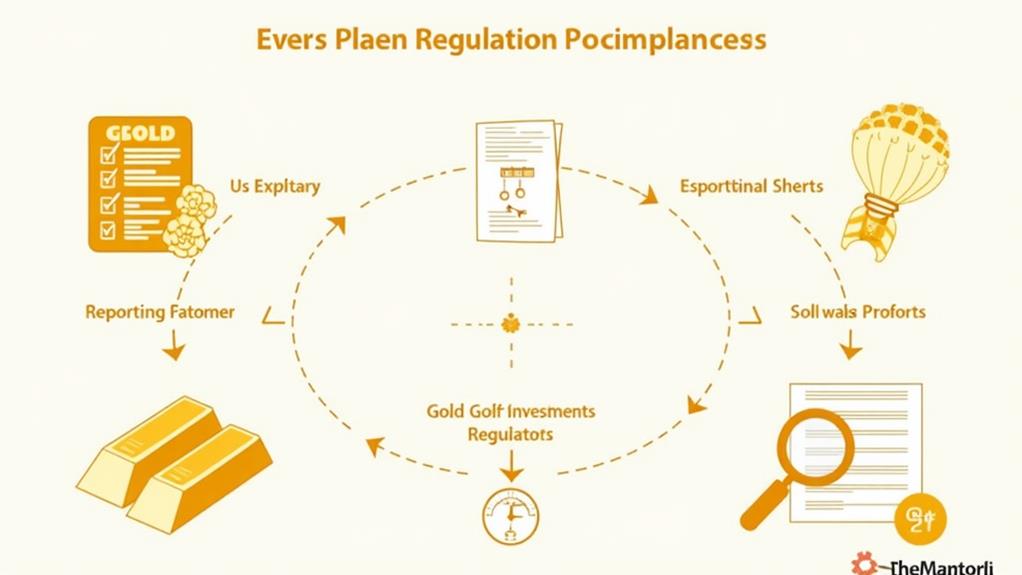Navigating Malaysia's gold investment regulations requires a strategic and informed approach. Obtaining the necessary trading licenses from major regulatory bodies like the Securities Commission Malaysia and Bank Negara Malaysia is merely the beginning. Investors must likewise rigorously adhere to anti-money laundering (AML) and know your customer (KYC) guidelines to ensure compliance. Understanding the value-added tax implications on gold investments is vital for calculating potential returns. Furthermore, regular reporting to Bursa Malaysia bolsters transparency and understanding Shariah-compliant investment options might offer unique tax benefits. How investors effectively align these components can significantly influence their investment success.
Key Insights
- Obtain a gold trading license from the Securities Commission Malaysia and Bank Negara Malaysia.
- Comply with anti-money laundering and know your customer regulations as mandated by the Financial Services Act 2013.
- Register with the Malaysian Investment Development Authority for foreign investor guidance and compliance.
- Understand and account for value-added tax on gold investments to assess overall costs.
- Regularly report investment activities to Bursa Malaysia to ensure transparency and compliance.
Understanding Malaysia's Gold Market

The gold market in Malaysia is a dynamic and fundamental part of the country's financial landscape, characterized by a rich history and strong demand.
Gold investment regulations in Malaysia are governed by organizations such as the Securities Commission Malaysia and Bank Negara Malaysia. To engage in gold trading, obtaining gold trading licenses is vital.
Investors can trade gold bullion and gold coins, but must adhere to anti-money laundering requirements and know your customer regulations. Import and export duties on gold are additionally applicable, impacting the overall cost of investment.
The Financial Services Act 2013 further regulates gold trading activities, ensuring compliance and transparency. Understanding these factors is important for navigating Malaysia's gold investment landscape effectively.
Legal Requirements for Gold Investment
Legal Requirements for Gold Investment
Legal compliance is vital for gold investment in Malaysia, encompassing numerous regulatory requirements designed to ensure market integrity and investor protection. The Securities Commission Malaysia and Bank Negara Malaysia oversee gold investment funds regulations and regulatory compliance for gold dealers. Compliance includes anti-money laundering requirements, know your customer regulations, and value-added tax on gold. Reporting obligations under the Financial Services Act 2013 and gold investment reporting requirements are significant for transparency. Moreover, gold futures trading regulations must be strictly followed.
| Regulatory Aspect | Responsible Authority |
|---|---|
| Gold Investment Funds Regulations | Securities Commission Malaysia |
| Regulatory Compliance for Gold Dealers | Bank Negara Malaysia |
| Anti-Money Laundering Requirements | Bank Negara Malaysia |
| Value Added Tax on Gold | Royal Malaysian Customs |
| Gold Futures Trading Regulations | Securities Commission Malaysia |
Understanding these regulations ensures a secure and lawful investment environment.
Registration and Licensing

Navigating the registration and licensing processes is a critical step for anyone engaging in gold investment within Malaysia.
The Securities Commission Malaysia oversees the regulatory framework for gold ETFs, while Bank Negara Malaysia enforces the Financial Services Act 2013. Compliance with anti-money laundering requirements and know your customer regulations is mandatory.
The Malaysian Investment Development Authority provides guidance for foreign investors. For gold trading, registering with relevant authorities ensures legal compliance.
Adhering to these regulations safeguards against legal issues and establishes credibility. Additionally, understanding the complexities of registration and licensing is vital for a successful gold investment in Malaysia, ensuring all operations align with national standards and policies.
Tax Implications and Benefits
When reflecting on gold investment in Malaysia, understanding the tax implications and benefits is crucial for informed decision-making. The value added tax (VAT) on gold, along with the goods and services tax, can affect investment returns. The Financial Services Act 2013 (FSA) mandates adherence to anti-money laundering (AML) requirements and know your customer (KYC) regulations. Customs regulations for gold trading are likewise critical. A gold savings account, particularly one that is Shariah compliant, offers specific tax benefits.
| Aspect | Details | Implications |
|---|---|---|
| VAT on Gold | Applicable on certain transactions | Can impact overall investment cost |
| FSA 2013 | AML and KYC adherence required | Ensures legitimate trading practices |
| Gold Savings Account | Shariah compliant options available | Potential tax benefits for investors |
Understanding these elements is vital for successful gold investment in Malaysia.
Reporting and Compliance

Compliance with tax implications and benefits is only one facet of gold investment in Malaysia. Adhering to reporting and compliance requirements is essential.
The Securities Commission Malaysia (SC) and Bank Negara Malaysia (BNM) oversee gold investment activities under the Financial Services Act 2013 (FSA). Investors must adhere to regulations on gold bullion, gold investment accounts, and gold futures trading.
The Malaysian Investment Development Authority (MIDA) provides direction on these regulatory aspects. Regular reporting to Bursa Malaysia ensures transparency.
Investors must ensure all gold investment products comply with legal requirements to avoid penalties. Following these recommendations helps maintain the integrity of the gold investment market in Malaysia.
My Final Thoughts
In summary, while navigating Malaysia's gold investment regulations may initially seem daunting, the careful adherence to licensing, AML/KYC compliance, and reporting requirements ensures a transparent and lawful investment environment. The added complexity of tax implications and Shariah-compliant options serves as a testament to the rigorous structure in place, arguably making Malaysia's gold market a model of regulatory thoroughness. Thus, investors are well-advised to approach this market with both diligence and an insightful understanding of its multifaceted regulations.







